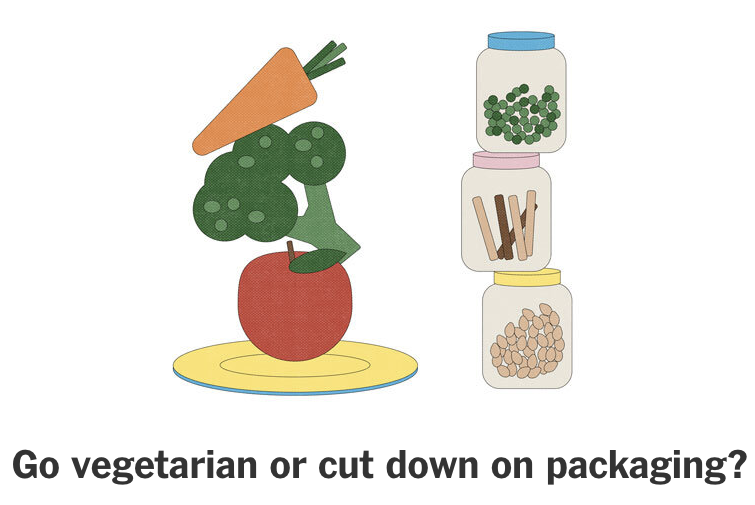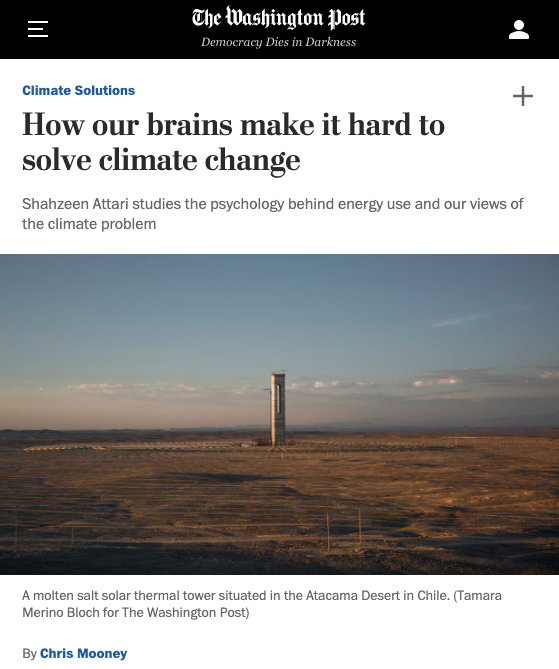Combating the climate crisis with cognitive science is a half day workshop organized by Rachit Dubey and Joshua Peterson from Princeton U.
New paper out - Moderating spillover: Focusing on personal sustainable behavior rarely hinders and can boost climate policy support
More evidence it is not *either* behavior or policy, but we (need and) can have both. Or as Elke would say: “Three cheers for silver buckshot”
Abstract: A successful climate movement must make progress on two fronts: widely adopting behavior changes to reduce emissions and achieving structural changes through climate policy. Some research has suggested people might see sustainable behavior as a substitute (rather than a complement) for climate policy. Does reflecting on sustainable behavior strengthen or undermine climate policy support? In the present research we find that reflecting on sustainable behavior rarely harms policy support. It only occurs when policies are framed as having costs fall on individuals (rather than industry) and when reflection on one’s behavior is not connected to one's values or identity. Here, people may reject a policy because they feel they already are taking action. Conversely, reflecting on behaviors in connection to one’s values or identity actually increases climate policy support, and leads people to feel that policies like a carbon tax, even if personally costly, reflect their values and identity.
Work with Gregg Sparkman and Elke Weber.
Going live on expert study
After working on designing and testing our expert elicitation interview to assess climate solutions, we are finally ready to collect data. Many of us have never met outside of zoom.
Meet our wonderful team: Alora Cain, Ananya Rao, Diksha Adukia, Thomas Nunn, Mary Sluder, Deidra Miniard, Ben Kravitz, Nathan Geiger, Landon Yoder, Shahzeen Z. Attari.
New paper out - Transforming energy use
Nudgestock - June 11, 2021
Nudgestock 2021: “It’s a day to think differently, where counter-intuitive ideas are discussed, debated and celebrated by the planet’s boldest thinkers.
They’re ready to tell you why things like mindfulness, climate change and vaccine hesitancy are all just load of Behavioural Science. With a side order of genius creativity to boot.” See you there. Free. Virtual. Global.
Also: John Cleese!!
Our lab's work featured in Washington Post
Our work on Perception of water systems co-authored with Kelsey Poinsatte-Jones and Kelsey Hinton is featured in the Washington Post.
“Solving the climate problem requires a lot more than individual behavior,” she emphasizes. “It requires our entire systems to evolve.”
The Power of Stories: Writing the Future of Our Planet - March 31
The Exchange and the National Academies' Roundtable on Science and Technology for Sustainability Present: The Power of Stories: Writing the Future of Our Planet
Together, we are writing the future of our planet. In the same way that we are living with the deeds and decisions of the past, the choices made and actions taken by those of us alive today will bear direct impact on the generations who come after we are gone. But how we imagine our future and tell those stories can serve as a predictor of what is to come. As prelude to the first-ever Nobel Prize Summit at the end of April, Nobel Prize Laureate Martin Chalfie, screenwriter Joe Robert Cole, and novelist Kim Stanley Robinson will examine the way in which those stories have the power to impact our vision of the future.
Moderated by Shahzeen Attari, who researches the factors that motivate action on climate change, this wide-ranging and eclectic conversation promises to be hopeful, optimistic, and above all, inspiring.
Shahzeen will serve on NASEM committee to advise the EPA
An ad hoc committee formed by National Academies of Sciences, Engineering, and Medicine will advise EPA's Office of Research and Development on emerging scientific and technological advances it could use in support of the agency’s mission for protecting human health and the environment over the coming decades.
New paper out: Better rules for judging joules
Climate Museum - Feb 12, 2021
Food by design
IDEO’s Food team uses design to connect, support, and enable leaders and organizations committed to solving the toughest problems across the food system. We’re digging into the decades of intentional policies that have created today’s inequitable food system. Plus, why language matters when talking about the challenges we face, and how agency is key to creating new food systems that work for BIPOC. Shahzeen is featured in this episode discussing the future of food.
Spending a day talking about climate change...
A Matter of Degrees
New podcast begins with a perennial topic for climate folks: does personal behavior change matter? Giving up your climate guilt interviews @billmckibben and @Shahzeen.
Shahzeen receives the IU Bicentennial Medal
“The Bicentennial Medal is awarded to organizations and individuals who, through their personal, professional, artistic, or philanthropic efforts, have broadened the reach of Indiana University around the state, nation, and world.”
This gorgeous medal was designed by IU faculty Jeeyea Kim. More about the design here.
Systemic racism in higher education
“Breaking down the barriers of systemic racism in STEM and achieving the promise of diversity, equity, and inclusion in STEM require unwavering dedication and real work. It is time to make the commitment to be an agent of change.”
I am just one of the 10k+ signatures on this letter to end systemic racism in higher education.
NYT Climate Quiz
Washington Post's climate quiz
Shahzeen and lab profiled in the Washington Post
Wonderful conversation with Chris Mooney about our research and some of the challenges of solving climate change by harnessing human behavior.
New piece in The Conversation
Both conservatives and liberals want a green energy future, but for different reasons — New piece in The Conversation with our wonderful editor Jennifer Weeks. Authors Deidra Miniard, Joe Kantenbacher, and Shahzeen Attari. A summary of our recent paper in PNAS on a Shared vision for a decarbonized future energy system in the United States.
Congrats Deidra!
Deidra Miniard, 3rd year PhD student in our lab, just received a grant to fund her research. She is set to receive $9,100 from the Sustainability Student Research Development Grant program, a partnership between the Office of Sustainability and the Integrated Program in the Environment. Her work will focus on social distancing, environmental justice, and climate change.




















